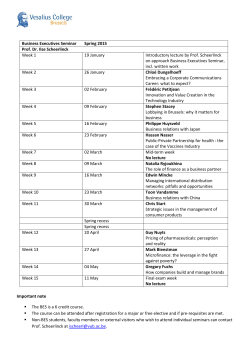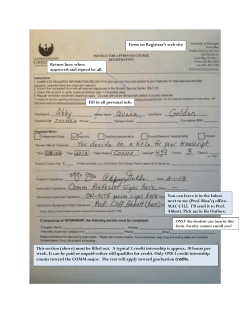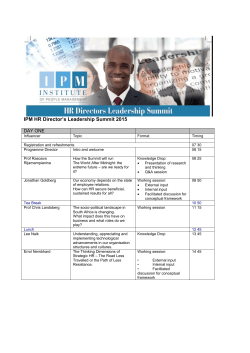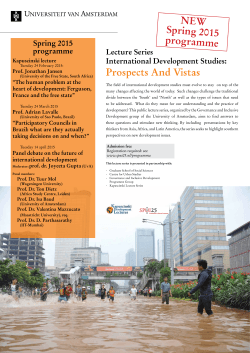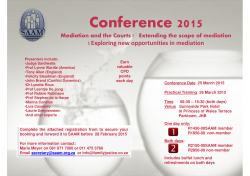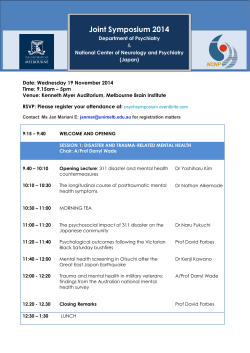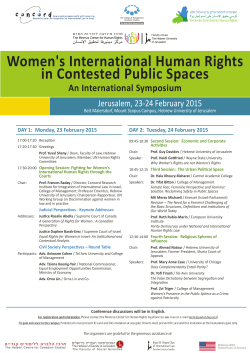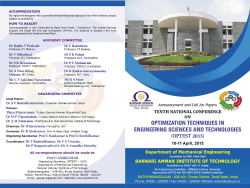
March 26, 2015 Issue No. 21 for Academic Year 2014-15
Issue No. 21 for Academic Year 2014-15 March 26, 2015 Dr. Leah Wittenberg, Head of the Department of Geography and Environmental Studies, served as one of the judges in "Around Israel – A Quiz on the Geography and Environment of Israel." The event of the Geography Supervisor of Central Israel in collaboration with the Israeli Geographical Association has been taking place for about a decade. The 2015 winner is Einav Kasif, a high school student from the school "Maayan Hashachar" in Kibbutz Ein Hahoresh, who surpassed thousands of students around the country to receive a study scholarship to the Department of Geography and Environmental Studies at the University. A large bronze mask of the god Pan, the first and only of its kind in the entire world was uncovered at the University of Haifa’s Zinman Institute of Archaeology excavation at Hippos-Sussita National Park. According to Dr. Michael Eisenberg, Head of the Institute, bronze masks of this size – larger than a human head – are extremely rare and usually do not depict Pan or any of the other Greek or Roman mythological images. "Most of the known bronze masks from the Hellenistic and Roman periods are miniature. I contacted the curators of some of the world's greatest museums, and even they said that they were not familiar with the type of bronze mask that we found at Hippos," he said. The findings appeared in the local media as well as in The Jerusalem Post, Fox News and USA Today. Thanks to the very generous $7,000,000 gift of the Leona M. and Harry B. Helmsley Charitable Trust as well as the support of the Planning and Budgeting Committee, last week an Automated Underwater Vehicle (AUV) was ordered for the Helmsley Charitable Trust Mediterranean Sea Research Center. The AUV, one of the most advanced in the world, is expected to get here in about a year and to open many new possibilities to Israeli research in the field. Prof. Morel Groper, Head of The Hatter Department of Marine Technologies and a researcher at the Helmsley Charitable Trust Mediterranean Sea Research Center, gave an interview to Ma'ariv on the subject: "The vehicle Over 25 researchers from Israel and around the world participated in an international research seminar lasting three days and held by the Department of Communication. The subject was Media Psychology, led by Dr. Nurit Tal-Or and Prof. Jonathan Cohen, and with the support of the Israel Science Foundation. There were two central themes in the conference: "Psychological Processes of Viewing and Viewing Together" and "Getting to Know the Theory of Imagination-Identification." The seminar opened with a fascinating lecture by Prof. Eliyahu Katz who spoke about five concepts in communication research that require a definition – selectivity, cross can perform many underwater tasks, without the intervention of the researchers, in a similar fashion to vehicles that NASA sent to Mars. For example, the vehicle can track down bodies underwater, like sunken ships and planes that crashed and drowned in the depths of the sea." pressures, opinion leaders, bi-level flow, and the spiral of silence. In addition, Prof. Yariv Tzfati, Head of the Department of Communication, said a few words in memory of Prof. Tamar Liebes z"l, who passed recently. The Department of Geography and Environmental Studies, in collaboration with the Younes and Soraya Nazarian Library, would like to invite you to the exhibit "The Largest Cities in Israel" where maps of the State of Israel and its largest cities are displayed according to subject cross-sections. The exhibit, which so far has been displayed in various places around the country, including the Knesset, is currently on display for two weeks at the University. The curator is Oren Raz from Israel's Central Bureau of Statistics. A group of third year students from the Rothschild Ambassadors program at the University, one of the cornerstones of the Rothschild Caesarea Foundation, organized a festive Purim party full of surprises for the tenants at Beit Shabtai Levi, a center for at-risk children up to age 7 in Haifa that is under the care of Welfare Services. The fun day began with a tour of the educational zoo, where the children met animals from around the world. They then continued to the nearby Gan Ha'em park for arts and crafts, theater games, preparation of Purim packages, the costumes corner and many more surprises the students had prepared for them. Last week was very busy for Prof. Gabi Weimann of the Department of Communication. He first interviewed at Bloomberg about the possibility of stopping "Lone Wolf" terrorism by global cyber surveillance. Next, he interviewed in Galei Tzahal about the last video released by ISIS in which a 12 year-old boy is seen executing one of the prisoners. He then interviewed for the NRG site where he explained why, in his opinion, the public debate during the election was not shallow in the social media. Prof. Niva Elkin-Koren, the Director of the Haifa Center for Law & Technology in the University's Faculty of Law, participated last month in a Google and Israel Internet Association event. "The piece of advice that needs to come out of this forum for legislators on the net is to take your time legislating, since legislating on the Internet obligates caution. There are many reasons for this, beginning with the global character of the net, the rapid changes that take place in it, as well as the means of resolution that spring from it," she said last week to Ha'aretz. The University recently hosted the opening of the International Brain Awareness Week organized by Prof. Gal Richter-Levin, Head of the University's Institute for the Study of Affective Neuroscience. Prof. Richter-Levin invited his colleagues from the University, Dr. Shlomo Wagner who lectured on the neural and hormonal basis of social communication, and Dr. Avi Mendelson who lectured on the influence of time on the representation of memories in the brain. He also invited two guests from the Technion: Dr. Asya Rolls, who uncovered the connection between sleep and memory, and Prof. Yoram Gutfreund who discussed animal consciousness. International Brain Awareness Week is a project in collaboration with the "BaSha'ar" association – "An Academic Community for the Benefit of Israeli Society" which takes place every March in parallel to the Western World Brain Awareness Week that includes lectures to disseminate awareness about novelties in brain research. "The use of vinegar as a cure for jellyfish stings not only does not help, it can even make the situation worse by causing the jellyfish's hunter arms to release more venom into the body," said Dr. Tamar Lotan of the Leon H. Charney School of Marine Sciences. "It was just last summer that we found that the myth that had developed surrounding the efficacy of vinegar as a substance that can counteract the effects of the jellyfish's venom was based on studies of Box Jellyfish. There is no study or reason to presume that the vinegar influences the venom mechanisms of the type of jellyfish common to these parts of the Mediterranean," she said in the English Ha'aretz.
© Copyright 2025

